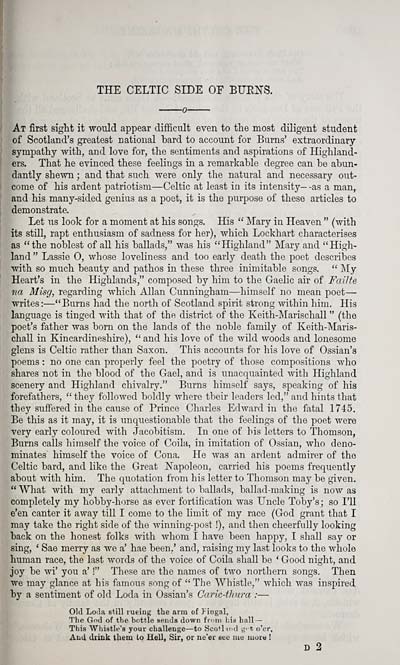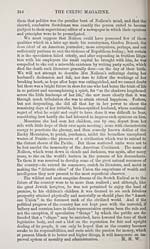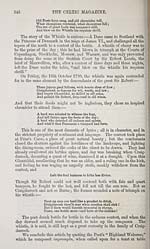Blair Collection > Celtic magazine > Volume 5
(355)
Download files
Complete book:
Individual page:
Thumbnail gallery: Grid view | List view

THE CELTIC SIDE OF BURNS.
At first sight it would appear difficult even to the most diligent student
of Scotland's greatest national bard to account for Burns' extraordinary-
sympathy with, and love for, the sentiments and aspirations of Highland'
ers. That he evinced these feelings in a remarkable degree can be abun-
dantly shewn ; and that such were only the natural and necessary out-
come of his ardent patriotism — Celtic at least in its intensity— -as a man,
and his many-sided genius as a poet, it is the purpose of these articles to
demonstrate.
Let us look for a moment at his songs. His " IVIary in Heaven " (with
its still, rapt enthusiasm of sadness for her), which Lockhart characterises
as "the noblest of all his ballads," was his "Highland" Mary and "High-
land" Lassie 0, whose loveliness and too early death the poet describes
with so much beauty and pathos in these three inimitable songs. " My
Heart's in the Highlands," composed by him to the Gaelic air of Failte
na Misg, regarding which Allan Cunningham — himself no mean poet —
writes: — "Burns had the north of Scotland spirit strong within him. His
language is tinged with that of the district of the Keith-Marischall " (the
poet's father was bom on the lands of the noble family of Keith-Maris-
chaU in Kincardineshire), " and his love of the wild woods and lonesome
glens is Celtic rather than Saxon. This accounts for his love of Ossian's
poems : no one can properly feel the poetry of those compositions who
shares not in the blood of the Gael, and is unacquainted with Highland
scenery and Highland chivalry." Burns himself says, speaking of his
forefathers, " they followed boldly where tbeir leaders led," and hints that
they suffered in the cause of Prince Charles Edward in the fatal 1745.
Be this as it may, it is unquestionable that the feelings of tlie poet were
very early coloured with -Jacobitism. In one of his letters to Thomson,
Burns calls himself the voice of Coila, in imitation of Ossian, who deno-
minates himself the voice of Cona. He was an ardent admirer of the
Celtic bard, and like the Great ISTapoleon, carried his poems frequently
about with him. The quotation from his letter to Thomson may be given.
" What with my early attachment to ballads, ballad-making is now as
completely my hobby-horse as ever fortification was Uncle Toby's; so I'U
e'en canter it away till I come to the limit of my race (God grant that I
may take the right side of the Avinning-post !), and then cheerfully looking
back on the honest folks with whom I have been happy, I shall say or
sing, ' Sae merry as we a' hae been,' and, raising my last looks to the whole
human race, the last words of the voice of Coda shall be ' Good night, and
joy be wi' you a' !" These are the names of two northern songs. Then
we may glance at his famous song of " The Whistle," which was inspired
by a sentiment of old Loda in Ossian's Caric-thura : —
Old Loda still rueing the arm of Fingal,
The Gnd of the bottle sends down fr^ni his hall —
This Whistle's your challenge— to Scotlind y t. o'er.
And drink them to Hell, Sir, or ne'er see me luoru !
At first sight it would appear difficult even to the most diligent student
of Scotland's greatest national bard to account for Burns' extraordinary-
sympathy with, and love for, the sentiments and aspirations of Highland'
ers. That he evinced these feelings in a remarkable degree can be abun-
dantly shewn ; and that such were only the natural and necessary out-
come of his ardent patriotism — Celtic at least in its intensity— -as a man,
and his many-sided genius as a poet, it is the purpose of these articles to
demonstrate.
Let us look for a moment at his songs. His " IVIary in Heaven " (with
its still, rapt enthusiasm of sadness for her), which Lockhart characterises
as "the noblest of all his ballads," was his "Highland" Mary and "High-
land" Lassie 0, whose loveliness and too early death the poet describes
with so much beauty and pathos in these three inimitable songs. " My
Heart's in the Highlands," composed by him to the Gaelic air of Failte
na Misg, regarding which Allan Cunningham — himself no mean poet —
writes: — "Burns had the north of Scotland spirit strong within him. His
language is tinged with that of the district of the Keith-Marischall " (the
poet's father was bom on the lands of the noble family of Keith-Maris-
chaU in Kincardineshire), " and his love of the wild woods and lonesome
glens is Celtic rather than Saxon. This accounts for his love of Ossian's
poems : no one can properly feel the poetry of those compositions who
shares not in the blood of the Gael, and is unacquainted with Highland
scenery and Highland chivalry." Burns himself says, speaking of his
forefathers, " they followed boldly where tbeir leaders led," and hints that
they suffered in the cause of Prince Charles Edward in the fatal 1745.
Be this as it may, it is unquestionable that the feelings of tlie poet were
very early coloured with -Jacobitism. In one of his letters to Thomson,
Burns calls himself the voice of Coila, in imitation of Ossian, who deno-
minates himself the voice of Cona. He was an ardent admirer of the
Celtic bard, and like the Great ISTapoleon, carried his poems frequently
about with him. The quotation from his letter to Thomson may be given.
" What with my early attachment to ballads, ballad-making is now as
completely my hobby-horse as ever fortification was Uncle Toby's; so I'U
e'en canter it away till I come to the limit of my race (God grant that I
may take the right side of the Avinning-post !), and then cheerfully looking
back on the honest folks with whom I have been happy, I shall say or
sing, ' Sae merry as we a' hae been,' and, raising my last looks to the whole
human race, the last words of the voice of Coda shall be ' Good night, and
joy be wi' you a' !" These are the names of two northern songs. Then
we may glance at his famous song of " The Whistle," which was inspired
by a sentiment of old Loda in Ossian's Caric-thura : —
Old Loda still rueing the arm of Fingal,
The Gnd of the bottle sends down fr^ni his hall —
This Whistle's your challenge— to Scotlind y t. o'er.
And drink them to Hell, Sir, or ne'er see me luoru !
Set display mode to: Large image | Transcription
Images and transcriptions on this page, including medium image downloads, may be used under the Creative Commons Attribution 4.0 International Licence unless otherwise stated. ![]()
| Early Gaelic Book Collections > Blair Collection > Celtic magazine > Volume 5 > (355) |
|---|
| Permanent URL | https://digital.nls.uk/76452957 |
|---|
| Description | Volume V, 1880. |
|---|---|
| Shelfmark | Blair.6 |
| Attribution and copyright: |
|
| Description | A selection of books from a collection of more than 500 titles, mostly on religious and literary topics. Also includes some material dealing with other Celtic languages and societies. Collection created towards the end of the 19th century by Lady Evelyn Stewart Murray. |
|---|
| Description | Selected items from five 'Special and Named Printed Collections'. Includes books in Gaelic and other Celtic languages, works about the Gaels, their languages, literature, culture and history. |
|---|

